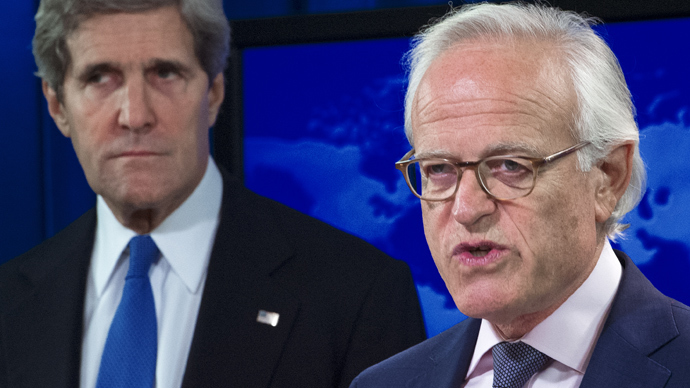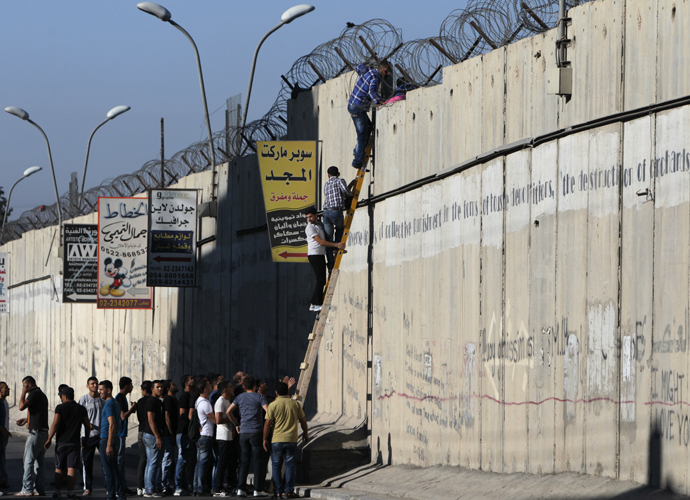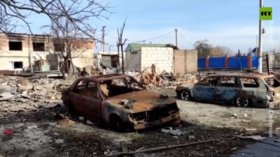The ‘no state’ solution: Palestinian peace talks are set-up to fail, again

It’s that time of the decade again, where US, Israeli and Palestinian officials start making noises about a ‘peaceful solution’ between Israel and occupied Palestine.
On the American side, US Secretary of State John Kerry has cut the negotiation ribbon, in hopes of following up on the extensive road map already laid out by former secretaries Hillary Clinton, Condoleezza Rice, Colin Powell, Madeleine Albright, Warren Christopher, and the list goes on.
If the Secretary of State is lucky enough to get something down
on paper over the coming months of meetings and negotiations, the
US President will then enter the diplomatic theatre, usually over
a long weekend at Camp David or a similar venue, and hopefully
sign some form of agreement underneath the names of the Israeli
and Palestinian leadership. In this case, Barrack Obama would be
following in the footsteps of his esteemed predecessors, George W
Bush, Bill Clinton, and others.
Each of these US officials have presided over various and sundry
celebrated announcements over the years, each time claiming a
“breakthrough” in the peace process, but the peace process
has never managed to be any more than that - a process.
For this reason, peace talks between Israel and Palestine have
been viewed as nothing more than an endless talking shop, and
have never resulted in implementing anything meaningful in terms
of improving the conditions for Palestinians.
The other fundamental problem is the regular flow of money from Israeli lobby groups like AIPAC to political campaigns in Washington DC, and the flow of billions in US “military aid” back to Tel Aviv. On this basis alone, the US cannot really be taken seriously as an objective party in any three way negotiation.
Whether through the unrelenting hard-line Israeli position, the powerlessness of the Palestinians, or impotence of the US in their role as a paid-off match referee, in each and every instance, Israel has managed to strengthen its position for any future round of talks. In every instance, Israel has done what it set out to do: to bite away at the remaining Palestinian land, drive out Palestinian residents and increase its Jewish settlements in the West Bank and the Negev.

Israeli steering via the quartet
The addition of a new piece to the Middle East peace process jigsaw puzzle has added to the confusion, due to its unusual position on the board.
With its headquarters in Jerusalem, “The Quartet” is the
new international confab created in 2001 and represents four
major bodies - the US, The EU, Russia and the UN. The appointment
of Britain’s former Prime Minister Tony Blair as the Quartet’s
Special Envoy in 2010, has not exactly inspired confidence in the
group’s ability to make any significant impact. For from being a
neutral player in the process, Blair has stood firmly in defense
of Israel’s own stoic negotiation stance.
From the beginning of his reign in Jerusalem, Blair has steered the Quartet’s position, as evidenced by his speech to the Lauder School of Government in Israel on 24 August 24, 2010, where he condemned the alleged campaign of "delegitimization" said to be carried out by “the enemies of Israel and proponents of the Palestinians, which refuses to grant Israel its legitimate right to its own point of view and self-defense”.
"Don't apply rules to the Government of Israel that you would
never dream of applying to your own country," he said. He
characterized such double standards and prejudice as being an
"affront to humanity" which "it is a democratic duty to
counter”.
He also believes that Israel Prime Minister Benjamin Netanyahu “is an advocate of peace”.
It’s not entirely clear what purpose The Quartet serves, aside from cheering the process along, but as its name demonstrates, it may just be there to provide the background music for what looks like a predetermined, pro-Israeli agenda.

The ‘no state’ solution
The West and Israel have been dangling the dream of an independent Palestinian state over the negotiating table for decades now, and with every successive round of talks, the idea of a ‘Two-State Solution’ seems to be become more and more hamstrung, not least of because of further colonial expansion and occupation by Israel itself.
Although the Two-State Solution was agreed upon in principle by both Israel and the Palestinian Authority at the November 2007 meeting at Annapolis, many believe that this approach was set-up to fail and any talk of a final agreement actually being signed is a political pipe dream. Moreover, even if a Palestinian state were to be recognized, they would be far from independent, as Israel is almost certainly never going to relinquish control over imports, exports, air travel, power, water and capital flows.
Another reason why negotiations are set up to fail could be the
UN’s recognition of Palestine based on its pre-1967 borders with
Israel. On the surface, this may appear to legitimize the
Palestinian cause but in actuality, it is a central source of
tension between the two sides.
The closest indication of progress to date took place in 2011 when the UN cultural body UNESCO voted to grant Palestinians full membership status. Celebrations were short-lived however as the US, under intense pressure from the Israeli Lobby, announced that in retaliation to the UN’s vote, Washington would be withholding funds to UNESCO in a move which US critics called geopolitical blackmail. Israelis do not appear keen at all to see Palestine achieve any UN status mainly because Tel Aviv know this could empower Palestinian officials to seek legal recourse, and perhaps even compensation, from the International Criminal Court for violations of international law including war crimes and the ongoing construction of illegal Jewish settlements.

The dominant paradigm: Political zionism
In advance of John Kerry’s efforts to kick-start the peace process this summer, Israel’s Economy Minister, Naftali Bennett, launched the Israeli right wing’s advance attack on the Two State Solution, claiming that the idea of establishing a Palestinian state in the Land of Israel has reached a "dead end” (Haaretz, June 2013).
The biggest stumbling block for the US and the Palestinians in these negotiations is the potent mix of religious fundamentalism and historical revisionism which continues to underpin Israeli political ideology on this issue. Bennett demonstrates this line of thinking as he explains, "It must be said that this land has been ours for 3,000 years". He added, "There was never a Palestinian state here and we were never occupiers. The house is ours and we are residents here, not the occupiers."
If only Tony Blair and the Quartet could apply the same vigor in defense of the Palestinians’ own legitimate roots claim to the region and inalienable “right to exist”.
Bennett went on to reinforce the micro-colonial agenda which still dominates Israeli policy on Palestine, "The most important thing in the Land of Israel is to build, build, build," he said. "It's important for there to be an Israeli presence everywhere. Our principle problem is still the unwillingness of Israeli leaders; (to) put it simply that the Land of Israel belongs to the People of Israel”.
Alternatively, there has been a revived interest in a ‘One-State Solution’, which is growing in popularity in some circles. Proponents of the One State Solution to the conflict advocate a single state in Israel, the West Bank, and the Gaza Strip, which includes citizenship and equal rights for all inhabitants regardless of ethnicity or religion. Unfortunately, this solution does not square with Zionist political vision of a pure “Jewish State”, and therefore is unlikely to ever gain serious traction on the Israeli side so long as the conservative hard-line Zionist ideology continues to dominate the Israel political leadership.

Nothing will happen
Understanding the reasons why the current paradigm of peace negotiations between Israel and occupied Palestine is destined for stalemate - and thus failure, is important if any solution to the conflict is to be achieved in the future.
Nearly 70 years of suffering by the native Palestinian population
and millions of refugees still interned around the Middle East
also means that any solution brokered by the US which does not
allow Palestinian refugees “the right of return”, will
ultimately fizzle out. Out gunned and with no economic or
military hand to play at the negotiation table, Palestinians are,
by default, the ones who matter least during any western-brokered
peace process.
For decades, Israeli political leadership has been dominated by a
series of throw-backs, consisting mainly of ex-Israel
paramilitary fighters, some of whom took part in violent ethnic
cleansing campaigns and even in terrorist bombings.
This string of leaders have all presided over a worsening situation; Ariel Sharon, Shimon Peres, Yitzhak Rabin, Yitzhak Shamir and Menachem Begin – all entrenched in the same extremist political belief system which is responsible for Israel being in the position it finds itself today.
Israel’s current figurehead, PM Netanyahu, maintains a similar hard-line to that of his predecessors that practically guarantees Israel’s predictable deadlock on negotiations and eventual failure on any future agreements.
He explains, "Foreign policy is shaped by the Prime Minister and my view is clear. I will seek a negotiated settlement where you'd have a demilitarized Palestinian state that recognizes the Jewish state". Palestinians have resisted Netanyahu's call for such recognition, fearing it would be tantamount to waiving any right of return for Palestinian refugees (Reuters June 2013).
For the US and former colonial powers Britain and France,
achieving balance and influence in a region dominated by an Arab
majority has always been a chief priority, not just
geopolitically, but also in terms of controlling global oil
markets. Since 1948, Israel has served as a temporary wedge in
the region, and a catalyst for general and periodic
conflicts, as well as fuelling the world’s most prolific and
lucrative arms and security product market.
After 30 years of failed peace talks, where the West has acted as the deity-like guiding hand over matters, it should be clear that for any real peaceful settlement to happen, it has to come from inside Israel. To achieve this, an urgent transformation needs to take place inside Israel - from hard-line ideologies and politics, as well as general Israeli attitudes towards Palestinians and Arabs – all of whom are still characterized as second class residents by Israeli society. When it becomes no longer beneficial to empower hard-line Israeli politicians in positions of political power – both in Israel and in America, then a peaceful solution is possible.
Until that time, we are left to suffer with the revolving door,
known as the “peace process”.
The statements, views and opinions expressed in this column are solely those of the author and do not necessarily represent those of RT.
The statements, views and opinions expressed in this column are solely those of the author and do not necessarily represent those of RT.














